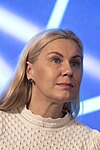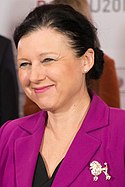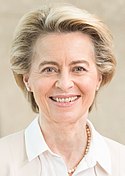První komise von der Leyenové
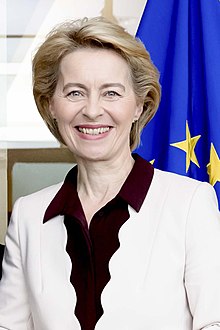
První komise Von der Leyenové byla Evropská komise působící od 1. prosince 2019 do 30. listopadu 2024. Její předsedkyní byla Ursula von der Leyenová. Dále se skládala z jednoho komisaře z každého členského státu Evropské unie (kromě státu předsedkyně, Německa). V prosinci 2024 ji vystřídala druhá komise Von der Leyenové.
Komise se měla ujmout funkce 1. listopadu 2019; kandidáti Francie, Maďarska a Rumunska však na začátku října 2019 ztratili důvěru Evropského parlamentu,[1] takže nové komisaře musela z těchto tří členských států vybrat nově zvolená předsedkyně a následně je potvrdit Parlament. Tento proces se uskutečnil v listopadu 2019 a Komise se nakonec ujala úřadu v celém rozsahu 1. prosince 2019.[2]
Volby a formace
Von der Leyenová, členka Evropské lidové strany (EPP), byla navržena Evropskému parlamentu dne 3. července 2019 Evropskou radou po třech dnech jednání mezi vůdci členských států. Čelila mnohé kritice, zejména z řad europoslanců, protože Evropská rada při jejím výběru do funkce ignorovala tzv. systém spitzenkandidátů.
Dne 16. července 2019 Evropský parlament hlasoval o návrhu Evropské rady a zvolil von der Leyenovou 383 hlasy (potřebných bylo 374 hlasů). Před hlasováním získala podporu tří největších politických skupin v Parlamentu (EPP, S&D a Obnova Evropy); během debaty deklarovaly svou podporu konzervativní polská strana Právo a spravedlnost s 24 poslanci a italské Hnutí pěti hvězd (M5S) se 14 poslanci. Na základě debaty a veřejných prohlášení europoslanců, většina europoslanců hlasujících proti von der Leyenové pravděpodobně pocházela ze skupiny S&D, jejíž součástí je také Sociálnědemokratická strana Německa, která se veřejně postavila proti von der Leyenové kvůli její práci jako ministryně německé obrany.[3]
Předseda Evropské rady Donald Tusk po svém zvolení požádal von der Leyenovou o souhlas se jmenováním Josepa Borrella ze Španělska příštím vysokým představitelem EU. Souhlas byl udělen dne 26. července 2019, načež Evropská rada dne 5. srpna 2019 oficiálně jmenovala Borrella příštím vysokým představitelem Unie pro zahraniční věci a bezpečnostní politiku.
Komise byla schválena Evropským parlamentem dne 27. listopadu 2019, získala 461 hlasů, 157 hlasů bylo proti a 89 se zdrželo hlasování. Pro hlasovaly EPP, S&D, Obnova Evropy a polovina ECR. Zelení/ESA se zdrželi hlasování.
| Koalice | Komise | Odevzdané hlasy | Většina | Ve prospěch | Proti | Zdrželi se | Zdroj | |
|---|---|---|---|---|---|---|---|---|
| EPP | Komise von der Leyenové | 707 | 374 | 461 | 157 | 89 | [4] | |
| S&D | ||||||||
| RE | ||||||||
Kolegium komisařů
Ještě před svým potvrzením ve funkci předsedkyně se von der Leyenová zavázala renominovat Franse Timmermanse, spitzenkandidáta Strany evropských socialistů, na prvního místopředsedu. Některé z členských států již předložily oficiální nominace úřadujícímu předsedovi Rady EU.
Von der Leyenová požádala, aby každý členský stát navrhl dva kandidáty, muže a ženu, aby bylo snazší vytvořit komisi vyváženou z hlediska pohlaví. Francouz Thierry Breton byl posledním kandidátem, kterého 24. října 2019 jmenoval Emmanuel Macron.
| Komise von der Leyenové | ||||||||
|---|---|---|---|---|---|---|---|---|
| Schválení Evropským parlamentem 27. listopadu 2019 • Jmenování Evropskou radou 28. listopadu 2019 | ||||||||
| Portfolium | Komisař | Portfolium | Komisař | Portfolium | Komisař | |||
| Předsedkyně | © European Union, 2024, CC BY 4.0 | Místopředseda a výkonný místopředseda — Zelená dohoda pro Evropu Interinstitucionální vztahy a strategický výhled |  | Výkonná místopředsedkyně a evropská komisařka — Hospodářská soutěž |  | |||
| [5][6] | [5][6] | [5][6][7] | ||||||
| Výkonný místopředseda a evropský komisař — Obchod | © European Union, 2025, CC BY 4.0 | Místopředseda a vysoký představitel pro zahraniční věci a bezpečnostní politiku |  | Místopředseda a evropský komisař — Podpora evropského způsobu života |  | |||
| [5][6] | [5][6] | [5][6] | ||||||
| Místopředsedkyně a evropská komisařka — Hodnoty a transparentnost | 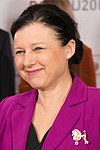 | Místopředsedkyně a evropská komisařka — Demokracie a demografie |  Dubravka Šuicová | Evropský komisař — Opatření v oblasti klimatu |  Wopke Hoekstra | |||
| [6] | [6][8] | [6] | ||||||
| Evropský komisař — Rozpočet | © European Union, 2024, CC BY 4.0 | Evropská komisařka — Inovace, výzkum, kultura, vzdělávání a mládež | © European Union, 2025, CC BY 4.0 | Evropský komisař — Pracovní místa a sociální práva | © European Union, 2024, CC BY 4.0 Nicolas Schmit | |||
| [6][9] | [5][6] | [5][6] | ||||||
| Evropský komisař — Hospodářství | © European Union, 2025, CC BY 4.0 | Evropský komisař — Zemědělství |  | Evropský komisař — Vnitřní trh |  | |||
| [6][10] | [6] | [6][11] | ||||||
| Evropská komisařka — Soudržnost a reformy |  | Evropská komisařka — Zdraví a bezpečnost potravin |  | Evropský komisař — Spravedlnost |  | |||
| [6][12][13] | [5][6] | [6][14] | ||||||
| Evropská komisařka — Rovnost |  | Evropská komisařka — Vnitřní záležitosti |  | Evropský komisař — Řešení krizí |  | |||
| [6] | [6][15] | [6][16] | ||||||
| Evropská komisařka — Doprava |  | Evropský komisař — Sousedství a rozšíření |  | Evropská komisařka — Mezinárodní partnerství | © European Union, 2025, CC BY 4.0 | |||
| [6][17] | [5][6] | [6][18] | ||||||
| Evropská komisařka — Energetika | © European Union, 2025, CC BY 4.0 | Evropský komisař — Životní prostředí, oceány a rybolov | © European Union, 2025, CC BY 4.0 | Evropská komisařka — Finanční stabilita, finanční služby a unie kapitálových trhů |  | |||
| [6][19] | [6][20] | [21] | ||||||
Změny
- 26. srpna 2020: Komisař pro obchod Phil Hogan odstoupil kvůli Golfgate.[22]
- 12. října 2020: Evropský parlament schválil Mairead McGuinnessovou, irskou nominantku, která nahradila Phila Hogana, a Rada Evropské unie ji jmenovala evropskou komisařkou.
- 15. května 2023: Marija Gabrielová rezignovala na funkci komisařky poté, co byla pověřena sestavením příští bulharské vlády.[23]
- 22. srpna 2023: Frans Timmermans odstoupil z funkce výkonného viceprezidenta pro Zelenou dohodu pro Evropu poté, co byl vybrán jako kandidát na nizozemského premiéra v nizozemských parlamentních volbách v roce 2023.[24]
- 19. září 2023: Iliana Ivanovová, bulharská nominantka, která nahradila Mariju Gabrielovou, je schválena Evropským parlamentem a jmenována evropskou komisařkou Radou Evropské unie.
- 9. října 2023: Evropský parlament schválil Wopkeho Hoekstra, nizozemského kandidáta, který nahradil Franse Timmermanse, a Rada Evropské unie jej jmenovala evropským komisařem.
Oddělení komise

Generální ředitelství
| Generální ředitelství | Příslušný komisař | |
|---|---|---|
| Jméno | Zkratka | |
| Daně a celní unie | TAXUD | Paolo Gentiloni |
| Energetika | ENER | Kadri Simsonová |
| Eurostat – Evropské statistiky | EUROSTAT | Paolo Gentiloni |
| Evropská civilní ochrana a operace humanitární pomoci | ECHO | Janez Lenarčič |
| Finanční stabilita, finanční služby a unie kapitálových trhů | FISMA | Mairead McGuinnessová |
| Hospodářská soutěž | COMP | Margrethe Vestagerová |
| Hospodářské a finanční záležitosti | ECFIN | Paolo Gentiloni |
| Informatika | DIGIT | Johannes Hahn |
| Komunikace | COMM | Ursula von der Leyenová |
| Komunikační sítě, obsah a technologie | CONNECT | Thierry Breton |
| Lidské zdroje a bezpečnost | HR | Johannes Hahn |
| Mezinárodní partnerství | INTPA | Jutta Urpilainenová |
| Migrace a vnitřní věci | HOME | Ylva Johanssonová |
| Mobilita a doprava | MOVE | Adina Văleanová |
| Námořní záležitosti a rybolov | MARE | Virginijus Sinkevičius |
| Obchod | TRADE | Valdis Dombrovskis |
| Oblast klimatu | CLIMA | Wopke Hoekstra |
| Obranný průmysl a vesmír | DEFIS | Thierry Breton |
| Podpora strukturálních reforem | REFORM | Elisa Ferreirová |
| Politika sousedství a jednání o rozšíření | NEAR | Olivér Várhelyi |
| Překlad | DGT | Johannes Hahn |
| Regionální a městská politika | REGIO | Elisa Ferreirová |
| Rozpočet | BUDG | Johannes Hahn |
| Společné výzkumné centrum | JRC | Iliana Ivanovová |
| Spravedlnost a spotřebitelé | JUST | Didier Reynders a Helena Dalliová |
| Tlumočení | SCIC | Johannes Hahn |
| Úřad pro připravenost a reakci na mimořádné situace v oblasti zdraví | HERA | Stella Kyriakidesová |
| Útvar interního auditu | IAS | Didier Reynders |
| Vnitřní trh, průmysl, podnikání a malé a střední podniky | GROW | Thierry Breton |
| Výzkum a inovace | RTD | Iliana Ivanovová |
| Vzdělávání, mládež, sport a kultura | EAC | Iliana Ivanovová |
| Zaměstnanost, sociální věci a sociální začleňování | EMPL | Nicolas Schmit |
| Zdraví a bezpečnost potravin | SANTE | Stella Kyriakidesová |
| Zemědělství a rozvoj venkova | AGRI | Janusz Wojciechowski |
| Životní prostředí | ENV | Virginijus Sinkevičius |
Výkonné agentury a servisní oddělení
Výkonné agentury
| Výkonná agentura | Hlava | |
|---|---|---|
| Jméno | Zkratka | |
| Výkonná agentura pro vzdělávání a kulturu | EACEA | Sophie Beernaertsová (zastupující) |
| Výkonná agentura Evropské rady pro výzkum | ERCEA | Laurence Moreauová |
| Výkonná agentura Evropské rady pro inovace a pro malé a střední podniky | EISMEA | Jean-David Malo |
| Výkonná agentura pro výzkum | REA | Marc Tachelet |
| Výkonná agentura pro klima, infrastrukturu a životní prostředí | CINEA | Paloma Aba Garroteová (zastupující) |
| Výkonná agentura pro zdraví a digitální oblast | HADEA | Marina Zanchiová |
Servisní oddělení
| Servisní oddělení | Hlava | |
|---|---|---|
| Jméno | Zratka | |
| Evropský úřad pro boj proti podvodům | OLAF | |
| Evropský úřad pro výběr personálu | EPSO | |
| Generální sekretariát | SG | |
| Infrastruktura a logistika – Brusel | OIB | |
| Infrastruktura a logistika v Lucembursku | OIL | |
| Inspire, Debate, Engage and Accelerate Action | EPSC | |
| Knihovna a centrum elektronických zdrojů | ||
| Nástroje zahraniční politiky | FPI | |
| Pověřenec pro ochranu osobních údajů | DPO | |
| Pracovní skupina pro jednání podle článku 50 se Spojeným královstvím | ||
| Právní služba | SJ | |
| Služba historického archivu | ||
| Služba podpory strukturální reformy | SRSS | |
| Správa a vyplácení individuálních nároků | PMO | |
| Úřad pro publikace | OP | |
| Útvar interního auditu | IAS | |
| Výkonná agentura pro inovace a sítě | INEA | |
Výběr kandidáta na předsedu
Po vzoru evropských voleb v roce 2014 jmenovaly hlavní evropské politické strany před volbami v roce 2019 takzvané spitzenkandidáty nebo vedoucí kandidáty, kteří byli kandidáty stran na příštího předsedu Evropské komise. Všechny strany jmenovaly alespoň jednoho kandidáta, některé jmenovaly dva a strana Aliance liberálů a demokratů pro Evropu (ALDE), která oficiálně vystupovala proti systému spitzenkandidátů, představila „Tým Evropa“, který se skládal z několika vysoce postavených evropských politiků. Ostatní strany však tyto kandidáty, zejména Margrethe Vestagerovovou z Dánska, vnímaly jako vedoucí kandidáty.
Vedoucími kandidáty byli:
| Strana | Vedoucí kandidátí | |
|---|---|---|
| Evropská lidová strana | ||
| Strana evropských socialistů | ||
| Aliance liberálů a demokratů pro Evropu | ||
| Strana evropských konzervativců a reformistů | ||
| Evropská strana zelených | ||
| Strana evropské levice | ||
Po vítězství ve volbách do Evropského parlamentu v roce 2019 Evropská lidová strana řekla, že by funkce předsedy Evropské komise měla být svěřena jí, a chtěla do této funkce dosadit svého vedoucího kandidáta Manfreda Webera. Weber však čelil silnému odporu ze strany liberálně orientovaného francouzského prezidenta Emmanuela Macrona a ALDE a také ze Strany evropských socialistů (PES). Důvodem pro jejich odpor byl nedostatek Weberových zkušeností, protože předtím působil pouze jako europoslanec a nikdy nezastával žádnou vládní funkci.[25] PES silně podporovala kandidaturu Franse Timmermanse, který měl podporu také od většiny členů ALDE v Evropské radě. (Andrej Babiš, tehdejší český premiér, je členem ALDE, ale také Visegrádské skupiny, která proti Timmermansovi ostře vystupovala kvůli jeho podpoře migračních kvót a neschopnosti dosáhnout kompromisů.[26]) Strana ALDE chtěla, aby nejvyšší funkci v Komisi převzala Margrethe Vestagerová.
První zasedání Evropské rady se konalo ve dnech 20. a 21. června 2019 a nepřineslo žádné rozhodnutí týkající se rozdělení nejvyšších pozic v EU. Předseda Donald Tusk znovu svolal vedoucí představitele na zvláštní setkání, které trvalo od 30. června do 2. července 2019. Po třech dnech vyjednávání EPP přestala usilovat o dosazení Webera na pozici předsedy Komise; zdálo se, že by mohl být nominován Timmermans, zvláště poté, co se během zasedání Evropské rady setkal na bulharském velvyslanectví v Belgii s bulharským premiérem a členem EPP Bojkem Borisovem. Jmenování Timmermanse předsedou Evropské komise bylo součástí takzvané Ósacké dohody, plánu, který vytvořilo několik vůdců EU (Emmanuel Macron, Angela Merkelová, Giuseppe Conte, Donald Tusk, Mark Rutte a Pedro Sánchez) během summitu G20 v Ósace v Japonsku v roce 2019.
Opozice Visegrádské skupiny, ke které se nyní přidalo Chorvatsko a Itálie, však byla stále silná a Timmermans nedokázal v Radě získat většinu. Mezi další jména zmíněná během jednání patřili Michel Barnier, Kristalina Georgievová a Andrej Plenković; po skončení Rady vyšlo najevo, že Plenkovićovo jméno představil generální tajemník Komise Martin Selmayr, který je Plenkovićovým blízkým přítelem. Kandidaturu odmítl Macron, který se postavil proti osobním ambicím lídrů.
Když se v průběhu jednání objevilo jméno Ursuly von der Leyenové (EPP), bylo to překvapení a čelila velké kritice, hlavně proto, že nebyla spitzenkandidátkou. Německá Sociálnědemokratická strana, součást německé vládní koalice, se proti von der Leyenové postavila kvůli její práci jako ministryně obrany, což vedlo k tomu, že se německá kancléřka Angela Merkelová při hlasování Rady o návrhu zdržela.
Volné místo kvůli brexitu
Spojené království nenominovalo vzhledem k blížícímu se odchodu země z EU žádného britského komisaře. Šlo o jedinečnou událost, která nemá v historii Evropské unie obdoby. Von der Leyenová musela formálně požádat britskou vládu o jmenování evropského komisaře. Někteří europoslanci navrhli možnost hlasování, které by umožnilo Evropské komisi fungovat bez britského komisaře.[27]
Spojené království opustilo Evropskou unii ve 23:00 GMT dne 31. ledna 2020, takže pozice britského komisaře zůstala neobsazená až do jejího automatického zrušení, když Spojené království oficiálně odešlo z Evropské unie.
Politika
Geopolitická komise
Na začátku svého mandátu předsedkyně Evropské komise von der Leyenová uvedla, že má v úmyslu mít „geopolitickou komisi“. Francouzský prezident Emmanuel Macron je nejdůležitější hybnou silou ambice geopolitické komise. Jeho vizí je, že se EU musí stát politickým a strategickým hráčem s jedním hlasem.[28] Kritici poukazovali na to, že předsedkyně Komise von der Leyenová vyvěšením geopolitické vlajky odhalila slabiny EU jako celku při hraní rozhodující role v diplomacii nejvyšší úrovně.[29]
Covid-19
V reakci na pandemii covidu-19 EU schválila balíček Next Generation EU v hodnotě 750 miliard eur. Komise von der Leyenové navrhla balíček dne 27. května 2020.[30]
Odkazy
Reference
V tomto článku byl použit překlad textu z článku Von der Leyen Commission na anglické Wikipedii.
- ↑ AMARO, Silvia. The new EU leadership is in limbo after lawmakers reject three new members. CNBC [online]. 2019-11-01 [cit. 2023-11-13]. Dostupné online. (anglicky)
- ↑ Von der Leyen’s in — now the hard work begins [online]. 2019-11-27 [cit. 2023-11-13]. Dostupné online. (anglicky)
- ↑ Ursula von der Leyen elected European Commission president [online]. 2019-07-16 [cit. 2023-11-15]. Dostupné online. (anglicky)
- ↑ Poslanci schválili novou Evropskou komisi pod vedením Ursuly von der Leyenové | Zpravodajství | Evropský parlament. www.europarl.europa.eu [online]. 2019-11-27 [cit. 2023-11-15]. Dostupné online.
- ↑ a b c d e f g h i j Von der Leyen reveals picks for European Commission. POLITICO [online]. 2019-07-11 [cit. 2024-02-23]. Dostupné online. (anglicky)
- ↑ a b c d e f g h i j k l m n o p q r s t u v w x y z Komisaři - Evropská komise. commissioners.ec.europa.eu [online]. [cit. 2024-02-23]. Dostupné online.
- ↑ DANIELSEN, Mikkel; AAGAARD, Thomas. Kommende kommissionsformand løfter sløret: Her er Vestagers nye job. Berlingske.dk [online]. 2019-09-10 [cit. 2024-02-23]. Dostupné online. (dánsky)
- ↑ Plenković predlaže Sanadera za tajnika HDZ-a, Šuicu za EK. Hrvatska radiotelevizija [online]. [cit. 2024-02-23]. Dostupné online. (chorvatsky)
- ↑ Bundeskanzlerin Bierlein zur Nominierung von Johannes Hahn als EU-Kommissar - Bundeskanzleramt Österreich. www.bundeskanzleramt.gv.at [online]. 2019-07-18 [cit. 2024-02-23]. Dostupné online. (německy)
- ↑ Il giorno di Gentiloni, i ruoli Ue in mano al Partito democratico. Il Fatto Quotidiano [online]. [cit. 2024-02-23]. Dostupné online. (italsky)
- ↑ Sylvie Goulard proposée par la France pour être commissaire européenne. Le Monde.fr. 2019-08-28. Dostupné online [cit. 2024-02-23]. (francouzsky)
- ↑ SIZA, Rita. Costa propõe Pedro Marques ou Elisa Ferreira para comissário europeu. PÚBLICO [online]. 2019-08-08 [cit. 2024-02-23]. Dostupné online. (portugalsky)
- ↑ Costa escolhe Elisa Ferreira para Comissária Europeia. Jornal Expresso [online]. [cit. 2024-02-23]. Dostupné online. (portugalsky)
- ↑ Commissaire européen: Didier Reynders est annoncé. Le Soir [online]. 2019-08-19 [cit. 2024-02-23]. Dostupné online. (francouzsky)
- ↑ NYHETER, S. V. T. Ylva Johansson föreslås bli ny EU-kommissionär. SVT Nyheter. 2019-08-08. Dostupné online [cit. 2024-02-23]. (švédsky)
- ↑ Vlada o predlogu kandidata za člana Evropske komisije in ustanovitvi Slovenske hiše v Bruslju | GOV.SI. Portal GOV.SI [online]. [cit. 2024-02-23]. Dostupné online. (slovinsky)
- ↑ Adina Valean approved as Romania's European Commissioner. euronews [online]. 2019-11-06 [cit. 2024-02-23]. Dostupné online. (anglicky)
- ↑ Finnish Government nominated Jutta Urpilainen as candidate for EU Commissioner. Valtioneuvosto [online]. [cit. 2024-02-23]. Dostupné online. (anglicky)
- ↑ The Government approved the proposal to submit Kadri Simson as the candidate for European Commissioner | Eesti Vabariigi Valitsus. www.valitsus.ee [online]. [cit. 2024-02-23]. Dostupné online. (anglicky)
- ↑ Lithuania puts forward economy minister for European Commission. POLITICO [online]. 2019-08-07 [cit. 2024-02-23]. Dostupné online. (anglicky)
- ↑ McGuinness named as Ireland's European Commissioner. www.rte.ie. 2020-09-08. Dostupné online [cit. 2024-02-23]. (anglicky)
- ↑ Trade chief Phil Hogan’s resignation blows hole in European Commission [online]. 2020-08-26 [cit. 2023-11-16]. Dostupné online. (anglicky)
- ↑ EU research commissioner Mariya Gabriel resigns [online]. 2023-05-15 [cit. 2023-11-16]. Dostupné online. (anglicky)
- ↑ Press corner. European Commission - European Commission [online]. [cit. 2023-11-16]. Dostupné online. (anglicky)
- ↑ EU leaders rule out Weber for top job: report – DW – 06/29/2019. dw.com [online]. [cit. 2023-11-20]. Dostupné online. (anglicky)
- ↑ Timmermanse neschválíme, prohlásil Babiš. Kritizuje jej za migrační kvóty a předsudky vůči střední Evropě | Domov. Lidovky.cz [online]. 2019-07-01 [cit. 2023-11-20]. Dostupné online.
- ↑ CORRESPONDENT, Joe Barnes Brussels. VDL lawyers working on plans for Boris refusing to send eurocrat to EU. Express.co.uk [online]. 2019-10-29 [cit. 2023-11-19]. Dostupné online. (anglicky)
- ↑ Europe’s next crisis: The geopolitical Commission [online]. 2020-02-03 [cit. 2023-11-19]. Dostupné online. (anglicky)
- ↑ Why the EU needs a geopolitical Commission [online]. 2020-09-15 [cit. 2023-11-19]. Dostupné online. (anglicky)
- ↑ Plán na podporu oživení Evropy. commission.europa.eu [online]. [cit. 2023-11-19]. Dostupné online.
Externí odkazy
 Obrázky, zvuky či videa k tématu První komise von der Leyenové na Wikimedia Commons
Obrázky, zvuky či videa k tématu První komise von der Leyenové na Wikimedia Commons
Média použitá na této stránce
Vlajka České republiky. Podoba státní vlajky České republiky je definována zákonem České národní rady č. 3/1993 Sb., o státních symbolech České republiky, přijatým 17. prosince 1992 a který nabyl účinnosti 1. ledna 1993, kdy rozdělením České a Slovenské Federativní republiky vznikla samostatná Česká republika. Vlajka je popsána v § 4 takto: „Státní vlajka České republiky se skládá z horního pruhu bílého a dolního pruhu červeného, mezi něž je vsunut žerďový modrý klín do poloviny délky vlajky. Poměr šířky k její délce je 2 : 3.“
Při zobrazení tohoto souboru lze snadno přidat orámování
Flag of Portugal, created by Columbano Bordalo Pinheiro (1857-1929), officially adopted by Portuguese government in June 30th 1911 (in use since about November 1910).
This is the national flag of Belgium, according to the Official Guide to Belgian Protocol. It has a 13:15 aspect ratio, though it is rarely seen in this ratio.
Its colours are defined as Pantone black, Pantone yellow 115, and Pantone red 032; also given as CMYK 0,0,0,100; 0,8.5,79,0; and 0,94,87,0.Finská vlajka
Zelený pruh má znázorňovat většinové katolické obyvatelsto Irska, oranžový pruh reprezentuje protestantskou menšinu a bílý pruh uprostřed znázorňuje mír a harmonii mezi nimi.
© European Union, 2025, CC BY 4.0
Press conference by Virginijus Sinkevičius, European Commissioner, on the Commission's first zero pollution monitoring and outlook report for air, water and soil
Autor: European Parliament from EU, Licence: CC BY 2.0
Before the European Parliament can vote the new European Commission led by Ursula von der Leyen into office, parliamentary committees will assess the suitability of commissioners-designate.
On 23-26 May, more than 200,000,000 people in 28 EU countries went to the polls to elect members of the European Parliament, giving them a strong democratic mandate, including voting into office the new European Commission and examining the competencies and abilities of its commissioners-designate. Elected members of the European Parliament will also listen to their ideas and will assess their willingness to take concrete actions on the issues that Europeans care about.
Each candidate commissioner is invited for a live-streamed, three-hour hearing in front of the committee or committees responsible for their proposed portfolio. The hearings will take place between Monday 30 September and Tuesday 8 October.
<a href="http://epinsta.eu/EPhearings2019" rel="noreferrer nofollow">epinsta.eu/EPhearings2019</a>
This photo is free to use under Creative Commons license CC-BY-4.0 and must be credited: "CC-BY-4.0: © European Union 2019 – Source: EP". (<a href="https://creativecommons.org/licenses/by/4.0/" rel="noreferrer nofollow">creativecommons.org/licenses/by/4.0/</a>) No model release form if applicable. For bigger HR files please contact: webcom-flickr(AT)europarl.europa.euAutor: European Parliament from EU, Licence: CC BY 2.0
The Internal Market and the Industry committees questioned Thierry Breton, candidate for the Internal Market portfolio.
The presidents and political groups’ coordinators from both committees will meet at 17.00 to assess the performance of the Commissioner-designate.
Digital, environmental and social challenges
In his introductory speech, Mr Breton spoke of the digital, environmental and social challenges the EU is facing and how he plans to address them during his mandate. The digital transformation and climate change will be high on his agenda, in line with President-elect Ursula von der Leyen’s priorities.
Mr Breton said that 5G, blockchain, Artificial Intelligence, cybersecurity, cloud and quantum technologies would enable the EU to be a “key industrial player”. He defended “ambitious industrial policies”, which should also be socially responsible, in order “not to leave anyone behind”.
Read more: <a href="https://www.europarl.europa.eu/news/en/press-room/20191112IPR66319/hearing-of-commissioner-designate-thierry-breton" rel="noreferrer nofollow">www.europarl.europa.eu/news/en/press-room/20191112IPR6631...</a>
This photo is free to use under Creative Commons license CC-BY-4.0 and must be credited: "CC-BY-4.0: © European Union 2019 – Source: EP". (<a href="https://creativecommons.org/licenses/by/4.0/" rel="noreferrer nofollow">creativecommons.org/licenses/by/4.0/</a>) No model release form if applicable. For bigger HR files please contact: webcom-flickr(AT)europarl.europa.euAutor: EU2017EE Estonian Presidency, Licence: CC BY 2.0
Photo: Arno Mikkor (EU2017EE)
Autor: Reinis Inkēns, Saeimas Kanceleja, cropped by Maliepa, Licence: CC BY-SA 2.0
Věra Jourová
Autor: Unión Europea en Perú from Lima, Perú, Licence: CC BY 2.0
Josep Borrell
Autor: European Parliament from EU, Licence: CC BY 2.0
Before the European Parliament can vote the new European Commission led by Ursula von der Leyen into office, parliamentary committees will assess the suitability of commissioners-designate.
On 23-26 May, more than 200,000,000 people in 28 EU countries went to the polls to elect members of the European Parliament, giving them a strong democratic mandate, including voting into office the new European Commission and examining the competencies and abilities of its commissioners-designate. Elected members of the European Parliament will also listen to their ideas and will assess their willingness to take concrete actions on the issues that Europeans care about.
Each candidate commissioner is invited for a live-streamed, three-hour hearing in front of the committee or committees responsible for their proposed portfolio. The hearings will take place between Monday 30 September and Tuesday 8 October.
<a href="http://epinsta.eu/EPhearings2019" rel="noreferrer nofollow">epinsta.eu/EPhearings2019</a>
This photo is free to use under Creative Commons license CC-BY-4.0 and must be credited: "CC-BY-4.0: © European Union 2019 – Source: EP". (<a href="https://creativecommons.org/licenses/by/4.0/" rel="noreferrer nofollow">creativecommons.org/licenses/by/4.0/</a>) No model release form if applicable. For bigger HR files please contact: webcom-flickr(AT)europarl.europa.euAutor: Unión Europea en Perú from Lima, Perú, Licence: CC BY 2.0
Ursula von der Leyen
Autor: Frankie Fouganthin, Licence: CC BY-SA 4.0
Ylva Johansson as newly appointed minister in Stockholm October 3, 2014.
Autor: Foreign and Commonwealth Office, Licence: CC BY 2.0
Foreign Office Minister Lord Ahmad meeting Didier Reynders, Belgian Deputy Prime Minister and Minister of Foreign Affairs and European Affairs in London.
© European Union, 2024, CC BY 4.0
On 20 September 2023, Nicolas Schmit, European Commissioner for Jobs and Social Rights, received Ivanka Shalapatova, Bulgarian Minister for Labour and Social Policy. They discussed the social initiatives that Bulgaria is launching, such as giving children good opportunities via the European Child Guarantee and implementing the Eu Minimum Wages. Ivanka Shalapatova, on the right, and Nicolas Schmit
Autor: euranet_plus, Licence: CC BY-SA 2.0
Working nine to five, it’s not a way to make a living. At least, if you’re a woman, your terms and conditions in Europe may not be as good as your male counterparts. The Euranet Plus radio network brought you a live studio debate from the European Parliament to discuss EU labour markets.
Get the guest list, the audio and video recordings of the debate and all other details at euranetplus-inside.eu/citizens-corner-debate-on-gender-eq...
Part 1/2 | Croatian | moderator Barbara Peranić | guests:
- Biljana BORZAN, MEP, Croatia, Group of the Progressive Alliance of Socialists and Democrats in the European Parliament, @BiljanaBorzan - Dubravka ŠUICA, MEP, Croatia, Group of the European People’s Party (Christian Democrats) @dubravkasuica - Ivan JAKOVČIĆ, MEP, Croatia, Group of the Alliance of Liberals and Democrats for Europe, @IvanJakovcic
- Dragica MARTINOVIĆ, Member of the European Economic and Social Committee, Employers’ Group (Group I), Director of the Representative Office of the Croatian Chamber of Economy in BrusselsAutor: European Parliament from EU, Licence: CC BY 2.0
Before the European Parliament can vote the new European Commission led by Ursula von der Leyen into office, parliamentary committees will assess the suitability of commissioners-designate.
On 23-26 May, more than 200,000,000 people in 28 EU countries went to the polls to elect members of the European Parliament, giving them a strong democratic mandate, including voting into office the new European Commission and examining the competencies and abilities of its commissioners-designate. Elected members of the European Parliament will also listen to their ideas and will assess their willingness to take concrete actions on the issues that Europeans care about.
Each candidate commissioner is invited for a live-streamed, three-hour hearing in front of the committee or committees responsible for their proposed portfolio. The hearings will take place between Monday 30 September and Tuesday 8 October.
<a href="http://epinsta.eu/EPhearings2019" rel="noreferrer nofollow">epinsta.eu/EPhearings2019</a>
This photo is free to use under Creative Commons license CC-BY-4.0 and must be credited: "CC-BY-4.0: © European Union 2019 – Source: EP". (<a href="https://creativecommons.org/licenses/by/4.0/" rel="noreferrer nofollow">creativecommons.org/licenses/by/4.0/</a>) No model release form if applicable. For bigger HR files please contact: webcom-flickr(AT)europarl.europa.eu© European Union, 2025, CC BY 4.0
Kadri Simson, European Commissioner in charge of Energy, during the The European Nuclear Forum in Bratislava, Slovakia on November 7, 2023.
Autor: European Parliament from EU, Licence: CC BY 2.0
Read more: <a href="http://www.europarl.europa.eu/news/en" rel="noreferrer nofollow">www.europarl.europa.eu/news/en</a>
This photo is free to use under Creative Commons license CC-BY-4.0 and must be credited: "CC-BY-4.0: © European Union 2020 – Source: EP". (<a href="https://creativecommons.org/licenses/by/4.0/" rel="noreferrer nofollow">creativecommons.org/licenses/by/4.0/</a>) No model release form if applicable. For bigger HR files please contact: webcom-flickr(AT)europarl.europa.euAutor: European Parliament from EU, Licence: CC BY 2.0
Before the European Parliament can vote the new European Commission led by Ursula von der Leyen into office, parliamentary committees will assess the suitability of commissioners-designate.
On 23-26 May, more than 200,000,000 people in 28 EU countries went to the polls to elect members of the European Parliament, giving them a strong democratic mandate, including voting into office the new European Commission and examining the competencies and abilities of its commissioners-designate. Elected members of the European Parliament will also listen to their ideas and will assess their willingness to take concrete actions on the issues that Europeans care about.
Each candidate commissioner is invited for a live-streamed, three-hour hearing in front of the committee or committees responsible for their proposed portfolio. The hearings will take place between Monday 30 September and Tuesday 8 October.
<a href="http://epinsta.eu/EPhearings2019" rel="noreferrer nofollow">epinsta.eu/EPhearings2019</a>
This photo is free to use under Creative Commons license CC-BY-4.0 and must be credited: "CC-BY-4.0: © European Union 2019 – Source: EP". (<a href="https://creativecommons.org/licenses/by/4.0/" rel="noreferrer nofollow">creativecommons.org/licenses/by/4.0/</a>) No model release form if applicable. For bigger HR files please contact: webcom-flickr(AT)europarl.europa.euAutor: European Parliament from EU, Licence: CC BY 2.0
Janez Lenarčič
Autor: European Parliament from EU, Licence: CC BY 2.0
Before the European Parliament can vote the new European Commission led by Ursula von der Leyen into office, parliamentary committees will assess the suitability of commissioners-designate.
On 23-26 May, more than 200,000,000 people in 28 EU countries went to the polls to elect members of the European Parliament, giving them a strong democratic mandate, including voting into office the new European Commission and examining the competencies and abilities of its commissioners-designate. Elected members of the European Parliament will also listen to their ideas and will assess their willingness to take concrete actions on the issues that Europeans care about.
Each candidate commissioner is invited for a live-streamed, three-hour hearing in front of the committee or committees responsible for their proposed portfolio. The hearings will take place between Monday 30 September and Tuesday 8 October.
<a href="http://epinsta.eu/EPhearings2019" rel="noreferrer nofollow">epinsta.eu/EPhearings2019</a>
This photo is free to use under Creative Commons license CC-BY-4.0 and must be credited: "CC-BY-4.0: © European Union 2019 – Source: EP". (<a href="https://creativecommons.org/licenses/by/4.0/" rel="noreferrer nofollow">creativecommons.org/licenses/by/4.0/</a>) No model release form if applicable. For bigger HR files please contact: webcom-flickr(AT)europarl.europa.euAutor: European Parliament from EU, Licence: CC BY 2.0
Before the European Parliament can vote the new European Commission led by Ursula von der Leyen into office, parliamentary committees will assess the suitability of commissioners-designate.
On 23-26 May, more than 200,000,000 people in 28 EU countries went to the polls to elect members of the European Parliament, giving them a strong democratic mandate, including voting into office the new European Commission and examining the competencies and abilities of its commissioners-designate. Elected members of the European Parliament will also listen to their ideas and will assess their willingness to take concrete actions on the issues that Europeans care about.
Each candidate commissioner is invited for a live-streamed, three-hour hearing in front of the committee or committees responsible for their proposed portfolio. The hearings will take place between Monday 30 September and Tuesday 8 October.
<a href="http://epinsta.eu/EPhearings2019" rel="noreferrer nofollow">epinsta.eu/EPhearings2019</a>
This photo is free to use under Creative Commons license CC-BY-4.0 and must be credited: "CC-BY-4.0: © European Union 2019 – Source: EP". (<a href="https://creativecommons.org/licenses/by/4.0/" rel="noreferrer nofollow">creativecommons.org/licenses/by/4.0/</a>) No model release form if applicable. For bigger HR files please contact: webcom-flickr(AT)europarl.europa.eu© European Union, 2025, CC BY 4.0
Participation of Ursula von der Leyen, President of the European Commission, in the the UN Climate Conference (COP26) in Glasgow
Autor: European Parliament from EU, Licence: CC BY 2.0
After assessing all the commissioners-designate, MEPs will decide on 27 November whether to elect the Commission as a whole, allowing it to take office on 1 December. Ursula von der Leyen speaking in a packed plenary chamber Commission President-elect Ursula von der Leyen speaks to plenary
The plenary vote on Wednesday would bring to an end the long process of careful examination by Parliament of the proposed team of commissioners. Its objective was to ensure that the EU’s executive body has the democratic legitimacy to act in the interest of Europeans.
MEPs elected Ursula von der Leyen as Commission president in July. Then, from the end of September to mid-November, parliamentary committees organised hearings with each of the nominees to judge their suitability for their proposed post.
On 21 November political group leaders and Parliament’s president Sassoli agreed that the process of examination had been completed and that Parliament is ready to hold the final plenary vote.
On Wednesday 27 November, President-elect Ursula von der Leyen will present her team and the new Commission’s programme. Following a debate, MEPs will decide by simple majority whether to elect the Commission or not.
If approved, the new Commission will start work on 1 December.
Read our Top Story Collection here: <a href="https://www.europarl.europa.eu/news/en/headlines/priorities/commission-president-2019" rel="noreferrer nofollow">www.europarl.europa.eu/news/en/headlines/priorities/commi...</a>
Autor: European Parliament from EU, Licence: CC BY 2.0
Before the European Parliament can vote the new European Commission led by Ursula von der Leyen into office, parliamentary committees will assess the suitability of commissioners-designate.
On 23-26 May, more than 200,000,000 people in 28 EU countries went to the polls to elect members of the European Parliament, giving them a strong democratic mandate, including voting into office the new European Commission and examining the competencies and abilities of its commissioners-designate. Elected members of the European Parliament will also listen to their ideas and will assess their willingness to take concrete actions on the issues that Europeans care about.
Each candidate commissioner is invited for a live-streamed, three-hour hearing in front of the committee or committees responsible for their proposed portfolio. The hearings will take place between Monday 30 September and Tuesday 8 October.
<a href="http://epinsta.eu/EPhearings2019" rel="noreferrer nofollow">epinsta.eu/EPhearings2019</a>
This photo is free to use under Creative Commons license CC-BY-4.0 and must be credited: "CC-BY-4.0: © European Union 2019 – Source: EP". (<a href="https://creativecommons.org/licenses/by/4.0/" rel="noreferrer nofollow">creativecommons.org/licenses/by/4.0/</a>) No model release form if applicable. For bigger HR files please contact: webcom-flickr(AT)europarl.europa.euAutor: Ministerie van Buitenlandse Zaken, Licence: CC BY-SA 2.0
Netherlands, The Hague, 2022-07-13
Min BZ Wopke Hoekstra op bezoek op het ROC Mondriaan
Photo: Kick Smeets / Ministry of Foreign Affairs 2022© European Union, 2025, CC BY 4.0
Portrait of Ursula von der Leyen, President of the European Commission
Autor: European Parliament from EU, Licence: CC BY 2.0
Before the European Parliament can vote the new European Commission led by Ursula von der Leyen into office, parliamentary committees will assess the suitability of commissioners-designate.
On 23-26 May, more than 200,000,000 people in 28 EU countries went to the polls to elect members of the European Parliament, giving them a strong democratic mandate, including voting into office the new European Commission and examining the competencies and abilities of its commissioners-designate. Elected members of the European Parliament will also listen to their ideas and will assess their willingness to take concrete actions on the issues that Europeans care about.
Each candidate commissioner is invited for a live-streamed, three-hour hearing in front of the committee or committees responsible for their proposed portfolio. The hearings will take place between Monday 30 September and Tuesday 8 October.
<a href="http://epinsta.eu/EPhearings2019" rel="noreferrer nofollow">epinsta.eu/EPhearings2019</a>
This photo is free to use under Creative Commons license CC-BY-4.0 and must be credited: "CC-BY-4.0: © European Union 2019 – Source: EP". (<a href="https://creativecommons.org/licenses/by/4.0/" rel="noreferrer nofollow">creativecommons.org/licenses/by/4.0/</a>) No model release form if applicable. For bigger HR files please contact: webcom-flickr(AT)europarl.europa.eu© European Union, 2025, CC BY 4.0
Jutta Urpilainen, European Commissioner for International Partnerships, during the 15th hybrid edition of the European Development Days (EDD), the leading global forum on development cooperation, in Brussels.
© European Union, 2025, CC BY 4.0
On 5 September 2023, Iliana Ivanova, European Commissioner-designate for Innovation, Research, Culture, Education and Youth, was auditioned at the European Parliament by the Committees on Industry, Research and Energy, Culture and Education to test her general skills, her European commitment and the specific skills linked to her portfolio. The main purpose of the hearings was to prepare for the European Parliament's vote of investiture of the new Commissioners.







